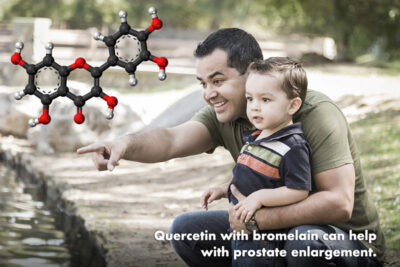For PROSTATE ENLARGEMENT, quercetin is a potent antioxidant that helps to calm the inflammatory response in prostate tissue, and thus to improve urine stream and bladder emptying, and protect the prostate from oxidative cellular damage.

For benign prostatic hyperplasia (BPH), quercetin is a potent natural treatment that has been gaining the respect of the medical community for several years. It has several mechanisms of action:
- Quercetin decreases the strong androgen dihydrotestosterone (DHT), a potent breakdown product of testosterone which can lead to hypertrophy or overgrowth of prostate cells;
- It stabilizes levels of sex hormone binding globulin (SHBG), a protein that can bind and adjust the amounts of testosterone in the blood to maintain more stable testosterone levels;
- Quercetin has the ability to inhibit part of the inflammatory cascade, by calming mast cells and preventing their activation and release of histamine. Less histamine and lower inflammation discourages prostate enlargement.
Quercetin is a flavonoid widely distributed in nature and found in onions, green tea, apples, berries, bell peppers, and buckwheat. Flavonoids are plant pigments that color vegetables and fruits. Studies show that quercetin is one of the most effective of the flavonoids: Many medicinal plants work because of their high quercetin content. To reach a therapeutic dose of around 500mg, you would need to eat at least 50 apples a day! So this is an important supplement to reduce the symptoms of BPH and inflammation.
Because it is becoming apparent that inflammation may play a role in the progression of BPH, natural remedies with anti-inflammatory properties can be extremely important for daily prostate protection. In response to the huge public interest in complementary therapies, especially nutraceuticals, for the treatment of prostate disease, researchers reviewed many studies. They concluded that “Phytotherapies, which would include quercetin, produced results equal to or better than pharmaceuticals currently prescribed for BPH.” In these studies, researchers noted that the mechanism of action of “phytotherapeutic agents (plant therapies) mimics the activities of currently marketed pharmaceuticals.”1
One tool used for assessing the success of BPH remedies and severity of symptoms is the International Prostate Symptom Score, or IPSS. This questionnaire asks men to score eight parameters from 0 to 5: incomplete emptying, frequency of urination, intermittency or stopping and starting, urgency, weak stream, straining to begin urination, nocturnal urination, and overall quality of life with the current bladder condition.
In a randomized, double-blind study of 28 men with chronic prostatitis/chronic pelvic pain syndrome (CP/CPPS), the researchers believe that the success of quercetin in easing urinary symptoms indicates a use for BPH. In this study, the men with CP/CPPS took either a placebo or 500mg of quercetin twice a day for one month. The study’s authors also conducted a follow-up open-label study on an additional 17 men: They received a quercetin supplement as well as a combination of bromelain, papain, saw palmetto, and cranberry which enhance quercetin’s absorption. At the end of the month, the men’s IPSS fell from 21.0 to 13.1 in the quercetin group, but barely at all in the placebo group (20 to 18.8). A significant 67% improvement in symptoms was experienced by the patients taking quercetin, versus minimal change for the placebo group. In the 17 patients who took the combined ingredients, 82% had a major improvement in their symptom score. Overall, the authors noted that quercetin “provides significant symptomatic improvement” in men who have CP/CPPS.2 These benefits for prostate health would also apply to BPH.
Researchers believe large-scale trials are vulnerable to variations because everyone has different genetics. Ten years later in 2010, the authors of the previous study conducted a multimodal study involving quercetin for 100 men with CP/CPPS who were identified to have a common phenotype. They found that quercetin was associated with a greater improvement in CPPS symptoms in a targeted group.3
Scientists reported their evaluation of quercetin in combination with the BPH drug Proscar (finasteride) on the prostate gland in a study published in the Journal of Endocrinology. This combination shrank the prostate, significantly reducing its weight. Quercetin appeared to work through a cell cycle-related pathway causing a decrease in dihydrotestosterone (DHT) that may function independent of androgens. The authors speculated that quercetin has some androgen-independent effect, benefits beyond stabilizing testosterone and DHT. Further studies are needed to clarify quercetin’s mechanism of action for BPH.4
Clinically, we know that quercetin alone is slow to be assimilated into the body. For our patients, we prefer a quercetin blend that includes a clinically effective dose of bromelain, a plant-based digestive enzyme extracted from pineapple. Bromelain boosts absorption by helping to move quercetin from the digestive tract into the bloodstream. Bromelain is also a potent anti-inflammatory in its own right and magnifies the inflammation-calming actions of quercetin.
Recommendation: Quercetin 500mg, ideally in a phytosome complex from sunflower extract, along with Bromelain 100-200mg, taken once to twice daily, best between meals, or as directed by your healthcare provider.
References
- Curtis Nickel J, Shoskes D, Roehrborn CG, Moyad M. Nutraceuticals in Prostate Disease: The Urologist’s Role. Rev Urol. 2008;10(3):192-206.
- Shoskes DA et al. Quercetin in men with category III chronic prostatitis: a preliminary prospective, double-blind, placebo-controlled trial. Urology 1999; 54(6):960-63.
- Shoskes DA et al. Phenotypically directed multimodal therapy for chronic prostatitis/chronic pelvic pain syndrome: a prospective study using UPOINT. Urology 2010 Jun; 75(6): 1249-53.
- Ma Z et al. Reduction of rat prostate weight by combined quercetin-finasteride treatment is associated with cell cycle deregulation. J Endocrinol 2004 Jun; 181(3): 493-507.